|
By: Dominique Chew 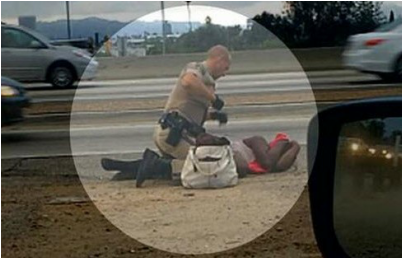 Lift ev’ry voice and sing, till earth and heaven ring, ring with the harmonies of liberty. Let our rejoicing rise high as the list’ning skies, let it resound loud as the rolling sea. We’re too intimate with brutality,” said Gina Athena Ulysse, author, feminist anthropology professor, ethnographer, member of the Haitian diaspora and performance artist, at a recent lecture I attended during the Brooklyn Book Festival. As she said these words, slow with firm intent, “We’re too intimate with brutality,” I thought of the time I was driving this summer, days after Sandra Bland’s death, and I noticed a cop car behind me and remembered that I didn’t have to be doing anything but looking like myself to get pulled over. I rehearsed what I would say to them to save my own life if they flashed their lights.
Comments
By: Gregory Williams This piece is, in many ways, an attempt to pick up a conversation that I tried to start two years ago, in 2013, when, New England, the region where I lived and worked, was responding to two violent events which received a great deal of media attention: the Newtown school shooting of December 14, 2012, and the Boston marathon bombing of April 15, 2013. It was a difficult conversation, then, and it is a difficult conversation now. To be right up front about it, dear reader, I am writing to tell you not to publicly mourn the death of a police officer. If you don’t want to read that kind of essay, now is the time to stop reading this one. 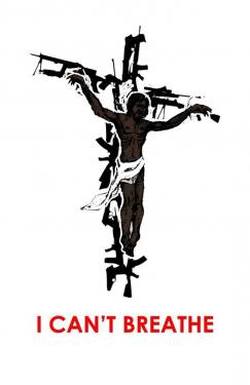 WHITE MARTYRDOM AFTER NEWTOWN AND BOSTON I wrote Newtown, Boston, and the Martyrology of Whiteness after it seemed as though New England had been in continuous mourning for several months. In December, 20 children and 6 staff at the Sandy Hook Elementary school had been killed, and faces of the victims, particularly white victims, were appearing on television screens and social media. Then, in April, three people were killed and hundreds were injured after a bomb exploded during the Boston marathon. The pictures of the victims were not as prominent in the media coverage, but what was was the non-white racial identity of the alleged killers. As someone working, at that time, with people who were undocumented, incarcerated, or homeless, most of whom were people of color, I could be (perhaps cynically) unfazed by the volume of mainstream and social media coverage: the deaths of children do not garner as much attention if those children are not white. What shocked me was the very personal nature of the treatment that the suffering that occurred at Newtown and Boston was receiving. I wrote, at the time, By: Jarrod Cochran JarrodCochran 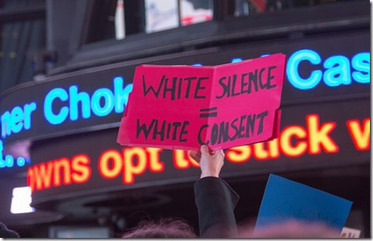 I was driving home from work when I heard about the eruption of protests in Baltimore over the death of 25 year-old Freddie Gray while in police custody. As I began to get a barrage of texts and posts on social media about the riots, I chewed it over in my mind and came up with something I felt was extremely eloquent to write about it. After I arrived home, I forgot those expressive words and stared at my blank computer screen. I began to give up and close the laptop thinking, "If you don't have something important to say, don't just run your mouth." That thought process sounds "right" on the surface. However, if we dig a little deeper, we see an ugly root. It is the Church's silence on the things that matter that has allowed so much ugliness in the forms violence, war, oppression, prejudice—all borne out of hatred and fear—to become manifest. Use your words. Use your body. Get in the way of violence and injustice. Take a stand. Just because you do not have the writing or oratory skills of Thoreau or Lucy Parsons does not mean that what you say matters less. Simply declaring that what is occurring in the world is wrong and taking a stand to make it right means more than a million good and eloquent intentions that never produced an action. When we are silent on the things that matter, we have already sided with the oppressor. It is with this understanding that I write to you now. 4/29/2015 Comments Standing Amidst the Wrath of GodBy: Nichola Torbett 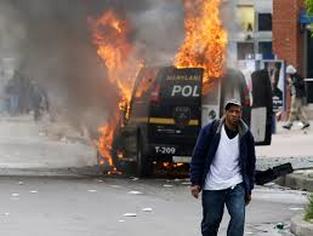 The wrath of God has been kindled and is pouring out of Baltimore in images of police cars on fire and CVS windows broken. It pours out of Baltimore as it poured out of Ferguson last summer. In the faces of chanting protestors there, I see the power of the life force refusing to be repressed any longer. The life of God is rising up and destroying the instruments of oppression like so many drowned Egyptian chariots. Praise God. Praise God, but I think if we’re honest, it makes a lot of us American Christians, and especially white American Christians like me, uncomfortable. And if ever we needed to be honest, it is now. In predominantly white progressive Christian circles, we are squeamish about this concept: the wrath of God. For instance, I have always wanted to celebrate the escape of the Hebrew slaves from Egypt while glossing over the drowning of the Egyptian soldiers in the Red Sea. After all, the Egyptian soldiers were people, too. Didn’t God care about them? 3/11/2015 Comments Violence is Violence?: Inter-generational Strife, Self-Defense, and the Black Lives Matter MovementBy: HH Brownsmith 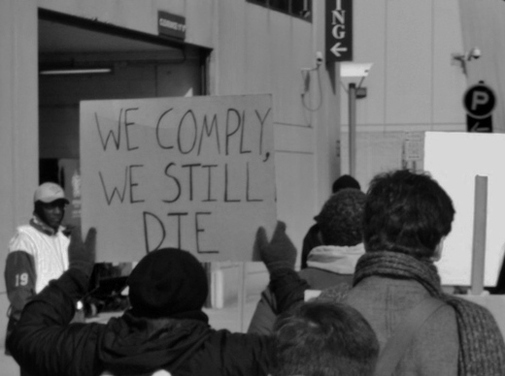 HKonJ March in Raleigh, NC. February 14, 2015. HKonJ March in Raleigh, NC. February 14, 2015. The Bible is brimming with instances of people waiting for a prophet or movement only to have that person or mobilization arrive and go unrecognized or, worse yet, be violently suppressed because it doesn’t conform to the expectations of the waiting masses. Since I started working and/or living in radical Christian settings seven years ago, I have heard elders wax nostalgic about the civil rights movement. I have watched older folks who lived during the end of the Jim Crow era weep when discussing their own recognition of that important historical and cultural shift. I have also watched elders chastise young folks, sometimes rightfully, for failing to care about this history; the nonviolent tactics employed; and the ways hearts, minds, and institutions were forever altered. I write about a lot of issues with the marginal confidence of a generalist. But if there is an issue on which my nerve consistently fails it is on the generational tension and resulting divide as it exists in the radical Christian left. This issue of generational conflict feels close…maybe too close. I have watched the “old guard” in established Christian communities push out younger folks for misunderstandings that boil down to generational politics (i.e. democratic socialism vs. anarchism). I have watched young people leave established churches to start generationally homogenous churches of their own. And, of course, I have seen so many people under 40 leave parish ministries and take their seminary training to chaplaincy work or academia. Wondering if perhaps there was something to our elders complaints that young folks are disrespectful and too "now focused", I decided to really seek instruction from "the silent generation". I am a member of a church with only 3 consistently attending members in their 20s (my partner and I are included in that number). I am now employed by that church. And over the last year I was part of an apprenticeship program administered by this church and five of my favorite ministers, all but one of whom is over sixty. This experience of committing to a religious community and earnestly trying to understand the stories that my generation supposedly won’t hear has given me a stronger understanding of our elders’ position. Naturally, greater understanding makes critique even harder. But I do hope that it gives the resulting critique the weight of a well-informed position. By: Ewuare X. Osayande This originally appeared on Ewuare's website. 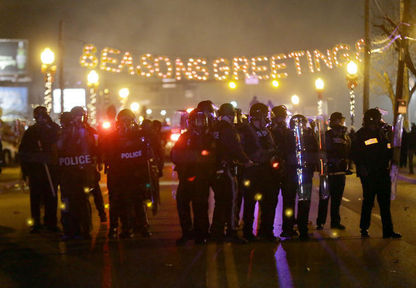 As many shop for Christmas presents in the malls of America, still many others have taken to the streets all over this nation in protest to the rash of police killings of African Americans under the banner of #BlackLivesMatter. This jarring juxtaposition of realities is best captured by the photograph from Ferguson of St. Louis police officers in riot gear standing below a “Seasons Greetings” banner bedecked with Christmas lights. The seasonal themes of “peace and good will” and “glad tidings to all men” have been rendered meaningless in the face of such fascistic state-sponsored intimidation as Christians prepare to celebrate the birth of their Savior, Jesus the Christ. But contrary to the sermons that are being preached during this Advent season, the first Christmas was not as “calm and bright” as the Christmas carol suggests. As today, that first Christmas pageant was indeed a pageant of protest. In fact, this present juxtaposition of realities was the same stark contrast faced by the people to whom Christ was born. The Hebrew people lived under fear of death at the hands of a militarized state. The level of repression being visited upon Black America at this very hour in the United States is strikingly similar in spirit and expression to what the people of Galilee felt and knew when Jesus was born. By: Peter Gallagher 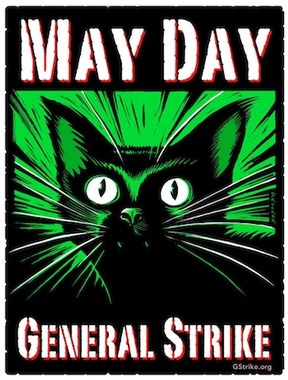 For a few brief moments on Tuesday, anarchy truly broke out in Seattle. Or at least it felt like it. The occasion was the May 1st General Strike, a day marked to disrupt the flow of capital in order to shed light on the daily injustices and atrocities that are wrought by our spiritually sick society. For me, it was a tragic day, yet very powerful and illuminating. Through writing this reflection, I hope to speak to what some implications might be for Christian anarchists. My experience leads me to believe that there is an immanent need for a soulful and reverent anarchist presence—and that we as followers of Jesus must abide by Jesus’ example of holy militancy: passionate, fearless, and present. May 1st 2012 is sure to go down as one of the most seismic and divisive days in Seattle’s recent history, perhaps since the WTO protests of 1999. The media had a field day; The Seattle Times carried a massive headline reading “Police move quickly to suppress anarchists”, accompanied by a full-page article with pictures of black-clad youth being towed off by cops. The story, according to them, was that on a day usually reserved for peacefully highlighting social justice causes, a violent faction of insurrectionary anarchists dressed in black—colloquially referred to as the “black bloc”—marred it by smashing up several banks, storefronts, fancy cars, and even the Federal Court of Appeals. This resulted in direct confrontation with the police, an executive order from the mayor to detain anyone carrying a large stick or flag, and numerous arrests. |
Disclaimer
The viewpoints expressed in each reader-submitted article are the authors own, and not an “official Jesus Radicals” position. For more on our editorial policies, visit our submissions page. If you want to contact an author or you have questions, suggestions, or concerns, please contact us. CategoriesAll Accountability Advent Anarchism Animal Liberation Anthropocentrism Appropriation Biblical Exegesis Book Reviews Bread Capitalism Catholic Worker Christmas Civilization Community Complicity Confessing Cultural Hegemony Decolonization Direct Action Easter Economics Feminism Heteropatriarchy Immigration Imperialism Intersectionality Jesus Justice Lent Liberation Theology Love Mutual Liberation Nation-state Nonviolence Occupy Othering Pacifisim Peace Pedagogies Of Liberation Police Privilege Property Queer Racism Resistance Resurrection Sexuality Solidarity Speciesism Spiritual Practices Technology Temptation Veganism Violence War What We're Reading On . . . White Supremacy Zionism ContributorsNekeisha Alayna Alexis
Amaryah Armstrong Autumn Brown HH Brownsmith Jarrod Cochran Chelsea Collonge Keith Hebden Ric Hudgens Liza Minno Bloom Jocelyn Perry Eda Ruhiye Uca Joanna Shenk Nichola Torbett Mark VanSteenwyk Gregory Williams Archives
October 2017
|
Search by typing & pressing enter

 RSS Feed
RSS Feed